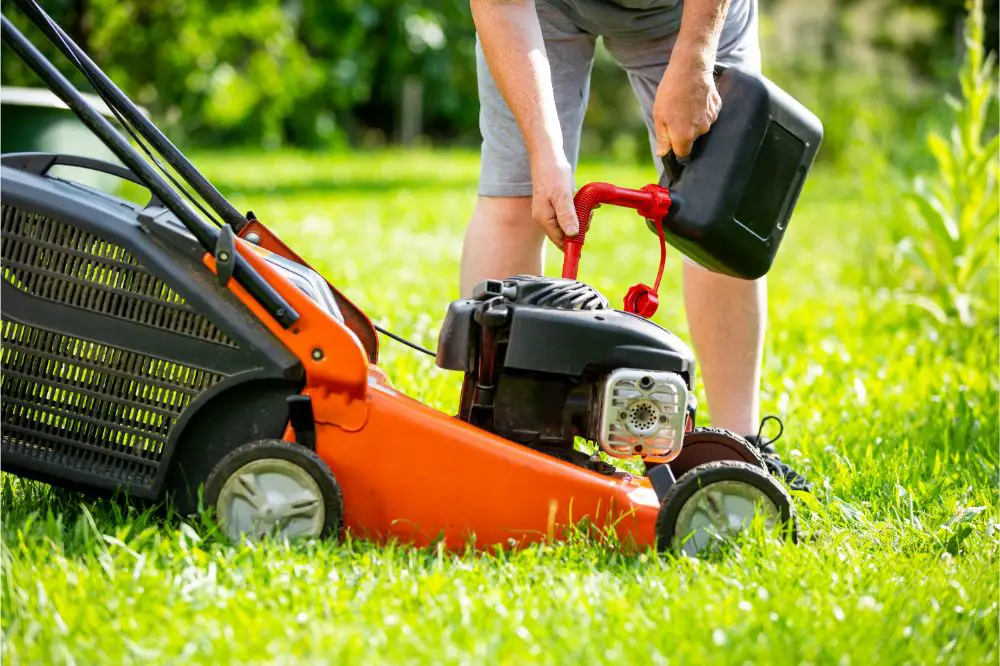A properly maintained lawn mower can serve you well for a long time. Central to mower maintenance is using the right engine oil.
Can I use 10w30 in a lawn mower instead of the go-to SAE30? is a question frequently asked by many, even those loyal to other brands.
To answer your question: yes, 10w30 mower engine oil is an excellent alternative.
However, there are other factors to consider when using this type of mower oil, the two most important being the temperature and engine.
With that, let’s now get into our discussion of how 10w30 and other engine oils work.
We hope this helps you make the best possible decision for mower engine maintenance.
- What Is the 10w30 Grade Motor Oil?
- What Is SAE30 Motor Grade Oil?
- What Is the Difference Between 10w30 and SAE30?
- Can I Use 10W30 Over SAE30 in My Mower?
- Are Low Viscosity Oils of Any Benefit?
- Does the Type of Oil I Use Matter?
- How Often to Check and Change Lawn Mower Oil
- Can I Use 10w30 in a Lawn Mower: In Conclusion
What Is the 10w30 Grade Motor Oil?
This oil’s name can be a mouthful and quite confusing.
According to the 10W30 classification, the viscosity of the engine oil is 10W if it is cold and 30W when it is hot.
In a nutshell, viscosity describes how much oil may resist flowing in terms of physics.
In layman’s terms, this is how quickly or how long it takes for the oil to drain from the tank when you turn the lawn mower upside down.
Oil is considered more viscous the slower it pours out of a bottle.
The SEA Standard
SEA or Society of Automotive Engineers developed a standard scale to make indicating viscosity easier.
Winter is symbolized by the letter “W”. Thus, the scale will show you a viscosity rating for winter ranging from 0W to 60W in intervals of five and 10.
As you can see, the 60W is the last and thickest of all.
That said, the multi-viscosity 10W30 is recommended for various reasons.
One is its viscosity allows for year-round use.
The 10W30 has the peculiar ability to perform well across a wide variety of temperatures, but especially in colder temperatures.
The 10w30 lawn mower oil is entirely distinct from the 5w30 mower oil because the 10w30 mower oil is thicker.
Most people favor the 10w30 mower oil since it improves fuel efficiency while consuming less oil in older mower motors.
The 10w30 mower oil also performs well in a variety of temperature ranges
What Is SAE30 Motor Grade Oil?
The oil is of a single grade and has an overall viscosity of 30.
The SAE30 motor grade oil only comes in one viscosity grade, unlike the 10w30 motor grade oil.
These oils are ideal for older engines and smaller air-cooled motors like those used in small tractors, lawn mowers, and chainsaws.
The typical shelf life of these oils is five years, and they perform better in warmer temperatures.
The SAE30 has a hot viscosity rating. Even though most contemporary engines use multi-grade oil, many four-stroke gasoline engines found in vintage automobiles, motorcycles, and powerboats continue to use SAE30.
What Is the Difference Between 10w30 and SAE30?
Viscosity is the main difference between the SAE30 and 10w30 lawn mower oils.
The viscosity of the multi-grade oil used in the 10w30 mower varies from 10 at low temperatures and 30 at high temperatures.
On the other hand, SAE30 has a constant 30 for its overall viscosity.
In addition, SAE30 has a typical thickness, while the 10w30 only gradually thickens as temperature rises.
Since it is used in heavy-duty 4-phase engines, the 10w30 multi-grade oil is denser than SAE30.
The SAE30 can be used only in summer, spring, and early winter because it lacks superior cold stream qualities, in contrast with the 10w30 lawn mower oil.
The SAE30 also offers higher overall protection and wear security.
It provides the best protection for LPSI gear, is environmentally friendly, and delivers the best protection against LPSI.
On the other hand, the 10w30 mower oil is ideal for engines with far more than 70,000 miles on them and provides the best warm breakdown protection, ultimately assisting in reducing exhaust emissions.

Can I Use 10W30 Over SAE30 in My Mower?
Yes, you may, but you must consider the surrounding environment.
SAE30 might be sufficient if you live somewhere with a warm climate all year round.
That said, you won’t have to get the 10W30 multi-viscosity if your climate is consistently warm.
The SAE30 thickness is ideal for your mower if the climate where you live doesn’t fluctuate much.
However, 10W30 oil is an excellent option if you reside somewhere where the seasons are fully experienced or where colder temperatures are more common.
This way, you won’t be thinking about your mower not starting when it gets chilly.
Additionally, the 10W30 will enable your mower to manage heat just as effectively.
10W30 oil can shield your mower in addition to handling a wide range of temperatures.
Since 10W30 shields your engine from impurities that may cause corrosion and blockage, your mower lasts longer and runs more efficiently.
Are Low Viscosity Oils of Any Benefit?
First and foremost, it’s essential to know that the oils in question can withstand cold temperatures because the “W” stands for winter.
Therefore, this category’s low viscosity oil is an excellent choice for the chilly winter months.
Thicker oil also flows more quickly and effectively. The motor oil lubricates the engine, making it as essential as fuel in mower or car operation.
For example, when you start a cold engine, the thinner motor oil quickly goes up before it begins to return to its former level.
The higher viscosity indicates that the oil will probably not thin out significantly after the machine’s engine heats up after running for a time.
This will guarantee that the engine’s components are separated by at least a thin layer of oil.
To keep this balance and guarantee that the mower’s engine has the correct lubrication to perform at its best, motor oil selection is vital.
If the engine is cold, the oil should flow properly, and when it warms up, there should be enough oil left over to prevent metal-on-metal friction.
Does the Type of Oil I Use Matter?
Yes, it greatly matters since it impacts how well or poorly your mower runs.
The amount of oil you put into your mower will determine how effectively it runs.
You must use the proper engine oil correctly with your lawn mower.
Lawn mower engines require oil to function as other internal combustion engines do.
Even simple engines contain many moving parts that are frequently made to operate at very high temperatures and speeds.
That’s why oil’s lubricating and cooling properties are crucial. Without it, the motor of your lawn mower would overheat, seize, and get damaged.
Multiple grades of motor oil are available based on the oil’s viscosity and how it responds to temperature changes.
Four-stroke engines are what are typically seen in lawn mowers.
It implies that while they require separate addition of motor oil to the engine’s crankcase, they also burn pure gasoline as it exits the service station pump.
A typical motor oil grade acceptable for several lawn mowers is 10W30.
Your owner’s manual will specify the exact grade needed, although 10W30 is typically the best choice for four-stroke engines.
Ultimately, using SAE30 is relatively constrained to your mower.
The most acceptable choice you have is 10W30 motor oil because of its adaptability.
10W30 oil will start your lawn mower whether it is hot or cold.
It’s important to note that certain 10W30 motor oil formulations include oil detergent.
Your engine is essentially cleaned with the oil detergent component to prevent sludge from entering it.
How Often to Check and Change Lawn Mower Oil
It is only possible to check and replace the oil in a mower with four-stroke engines.
Before every mow session, you must monitor the condition and top off unless necessary.
With the first five hours of use on a four-stroke lawn mower, change the oil.
A new engine’s early wear is caused by the movement inside the parts, which releases tiny metal particles into the oil.
If these filings are kept in the oil, they will continue to create excessive wear.
Change the mower oil in a walk-behind mower at least once every season or every 50 hours of operation.
For a riding mower, change the oil after 100 hours or more of use.
You should use the oil recommended in your lawn mower owner’s handbook, but you should also pay attention to the dipstick or oil level gauge, a standard feature on every four-stroke mower engine.
Can I Use 10w30 in a Lawn Mower: In Conclusion
Can I use 10w30 in a lawn mower? Using 10W30 motor oil in preference to SAE30 is possible and highly recommended for lawn mowers.
However, SAE30 engine oil is ideal for hot weather.
The 10W30 engine oil operates well for cold and warm weather, making it a better option than SAE30 in regions with the entire four seasons.
Checking your oil levels regularly is vital because your lawn mower depends heavily on it.
To ensure the oil never goes too low, use the dipstick on your mower to check the level.
Make sure not to put too much oil when refueling your lawn mower.
You will have difficulties starting the mower if you put too much.


